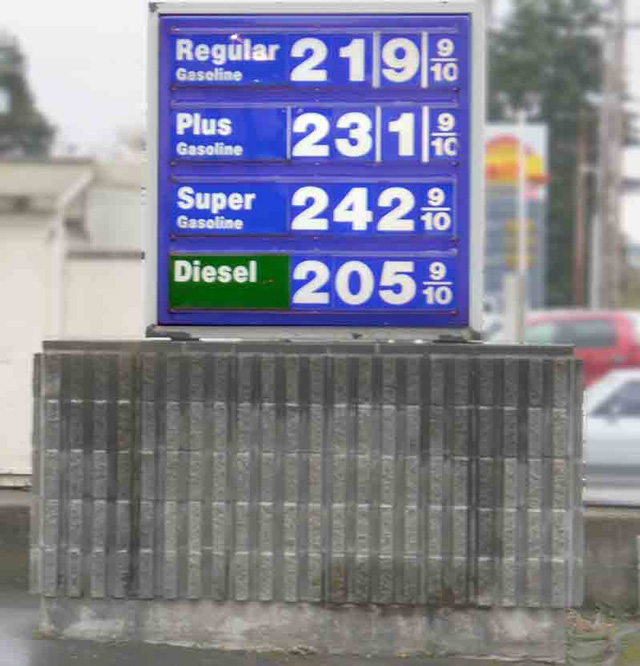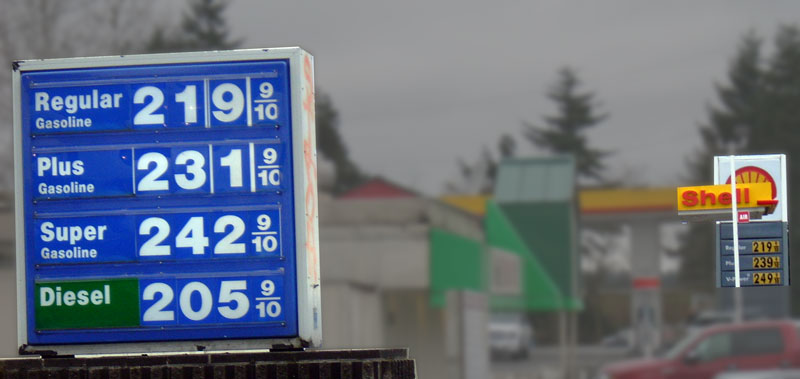
I snapped this shot yesterday on my way into work. I had stopped to get gas at my freeway exit. Yes, I said get gasoline. I drove the pickup truck to work since I was planning to buy a barrel of Methanol for my home-brew BioDiesel, and ironically the pickup has a gasoline engine. I only drive it once a in a blue moon… dump runs, lumber, hay, whatnot. Driving it to Seattle is a rare (and expensive) event. I noted the price of Diesel was on-par with unleaded gasoline the last time I put pump-fuel into my Diesel car, and yesterday I noted as you can see above, that Diesel fuel is now less expensive than all grades of gasoline. This is how it should be, since Diesel is a less complex product to manufacture than gasoline. This is how it has normally been historically. In fact I can recall when Diesel was less than half the price of gasoline. This situation only changed after the mandate for Ultra Low Sulfur Diesel (ULSD) and US-based refineries had to reconfigure to produce it. This coincided with Hurricane Katrina and the overall run up in petroleum prices across the board. As a result for the past 4 years Diesel fuel has been, on-average more costly at the pump than gasoline.

Oddly the false “Diesel is always more expensive” meme has spread throughout the Internet. When I visit websites where normally thoughtful people discuss things automotive, such as The Truth About Cars, any time Diesel as motive power comes up people always bring up this fallacy: “Diesel is XX% more expensive than gasoline, so the math doesn’t work out for cost savings to see ROI on the purchase of a Diesel over a gasoline car.” Endless variations on this patently wrong argument. This is in reality Confirmation Bias. Automotive enthusiasts just don’t like Diesel. It isn’t sexy. It has engine noise but no exhaust note. But instead of just plainly stating their bias, they come up with mathematical, so theoretically logical, reasons why it is not a viable choice.
I have no problems with people not liking it, I really don’t. Just admit it, that’s all I ask. Don’t try to obscure your dislike behind logic or mathematics, or attribute it to market forces… because those are not valid reasons to dismiss Diesel. They are also not the source for the lack of Diesel car options in America.
I think the average consumer would likely buy more Diesel cars if they had the option to do so. Diesels provide a lot of what people want: They are reliable. They last longer. They deliver lots of torque (people buy horsepower, but drive torque.) But most of all they provide amazing fuel economy, especially under highway usage. My roomy, comfortable 5-passenger VW Jetta regularly achieves 50 MPG under usage as my commuter car, meaning a mixture of highway cruising and bumper-to-bumper traffic. It does so with simple, proven technology. No need for complex hybrid drivetrains. Best of all, I can make my own fuel for about $1 a gallon! Mind you your average consumer won’t ever do that, but at least with a Diesel, it is an option.
In Europe, where consumers actually have a choice of motive power when they buy their cars, around half of them choose a Diesel engine. Ironically here in America, supposed “home of the free”, we are not allowed that choice. People often blame General Motors, and their disastrous Diesel engine products of the late 1970s & early 1980s. They say that soured the reputation of Diesel for cars in the minds of consumers here in America. I don’t buy that argument. The car buyers of that era are now all retired. Not all Diesels from that time were bad either. The Mercedes Diesels from that same period were highly regarded and most are still on the road! (And demanding amazing prices. Twelve grand for a car with over 200,000 miles? Only a Diesel.) Search for “TDI” on Craigslist or eBay and be astonished at the strong resale market value of the few Diesel cars sold in the US in the past 20 years.
So what has created this odd market?
The California Air Resources Board. They have been trying to kill Diesel as a motive power option in cars for almost 30 years, and they’ve been largely successful. Their issue with Diesel is particulates. Soot. They began their anti-Diesel crusade in the midst of a near continuous drought that lasted from 1976 until 1992. In a rainy climate such as we have here in the Pacific Northwest (the rains have returned by the way… ahhhhh) particulates are somewhat irrelevant. Soot is moot.
Historically, California has moved the goalposts on Diesel emissions whenever the technology matches the CARB regulations. From Trap Oxidizers in the late 80s to Urea Injection today, whenever the engineers build a Diesel capable of meeting the standard, CARB tightens the standard to keep Diesel out of cars. Cars mind you, not trucks, or trains, or ships, or power generation, just cars.
But many states adhere to California’s mandates and since California is the lowest common denominator and largest market in the USA, the automobile manufacturers build to suit the California specifications for cars. So unlike the consumer in Europe, we have no choices of motive power when we purchase a car. Here, if you want to buy a Diesel you buy a truck… exempt from tighter emissions regulations… or you can buy maybe one or two models of car. Prior to the ULSD mandate just about every VW was available with the 1.9L TDI powerplant; the New Beetle, Jetta, and Passat. Now it is just the Jetta, when they are available. Mercedes occasionally makes one model of E-class available with a Diesel power plant. This year we have 3 choices, with the addition of the BMW 335d. If you are like me and prefer to swap your own cogs though, you’re back to a single choice, as both the Merc and the Beemer are equipped with automatic transmissions.
What I really want is a commuter car. Something small, lightweight, and economical. I’d buy a MINI-D in a heartbeat. Equipped with a 1.6L Turbo-Diesel it attains over 60 MPG. Or how about an Alfa Romeo Spider JTDm? (seen here in America, but sadly not for sale here. 🙁 ) How about VW’s “BlueSport Roadster?” Ship VW, I’ll buy it. But some bureaucrats in Sacramento have decided that I shouldn’t be able to buy any of these. Oh well.
Meanwhile people remain unaware of how frugal their options could be. How mid-sized cars could be getting 40+ MPG, and small cars getting up to 70 MPG. They’ve been brainwashed into thinking that Diesel is bad. Diesel is loud. Diesel is smoky. And of course, Diesel is always more expensive than gasoline.
Look at the photo above again.
why not travel to buy a new diesel overseas Chuck? or ship one in? or would there be too many rules to comply with or something…
and diesel prices in Europe are not that cheap either… used to be about half petrol here but gap has closed a lot over last 5 years or so… but still a lot cheaper ($1 for diesel and about $1.64 for 91)
Jerome
Actually that Alfa is available in Mexico. I’ve thought about flying down to Cabo San Lucas or somewhere and just driving it home! I imagine getting it registered would be a royal hassle though.
Mr Clarkson says real gearheads have to own an Alfa at least once in their life! no matter how ugly they are! 😉
every car in the Hyundai range in NZ has diesel option – quite a selling point that they have been pushing with good success… and all the rest many option within their range – USA is certainly missing out…
good luck with your quest… maybe you could re-motor the jag instead? 😉
Jerome
Never mind the MINI-D; I’ll take an Alfa Romeo MiTo diesel hatchback. I saw several on my recent trip to Europe and was salivating horribly…
The MiTo is cool, but I want a drop-top Diesel John.
I note though that Alfa will have a MiTo cabriolet in 2010
I think we sell about 50 new Mercedes-Benz cars with diesel engines for every new gasoline engined car at the Mercedes-dealership where I work.
I used to be a diesel-hater myself once, when they were slow, noisy and smelly. But while the technology has been at a standstill on gasoline engined cars since the mid-nighties, huge progress have been made on the diesel engine with commonrail technology and Piezo-nozzels. Okey, you can still hear that it is diesel-powered if the car is idling on a frosty morning, and you still have to pre-glow it a few seconds on startup. But it is worth it for the torque and mpg`s
Wow! 50:1? Is that a true estimate, or are you exaggerating Ove?
I have to admit I have a desire to find a well-maintained C123 (aka Mercedes-Benz 300CD turbo) with the legendary OM617 motor. Built like a Panzer those cars were… sigh.
Should I go check it our fer ya?
🙂
http://denver.craigslist.org/cto/1029340461.html
Hi Chuck,
One thing that I think you may have overlooked in your Diesel pricing rant is that tiesel fuel comes out of the same part of the barrel as heating oil. Because of this it’s price tends to be more volatile in NA during the winter heating months when there is a strong demaind for heating oil. Admittedly diesel has been trending above petrol/benzene/gasoline for the last few years but price is always pushed up duringthe winter. We are now at the end of the winter heating seasion and demand for fuel oil has slackened. This has brought about an excess of this fraction and depressed prices.
Cheers,
Shaun
Yes Shaun, Diesel prices have always had a seasonal trend, and driving an oil-burner since the early 80s I’m pretty in-tune with those variances.
But who says it is “the end of winter”?? We had 3″ of snow yesterday! 😛
The CARB actually has created increasingly stringent rules for trucks and trains as well as cars and pickups, though perhaps that is not as widely publicized. The ULSD rules came out of – I think – this rulemaking for trains and trucks.
Also, diesel is closely related to jet fuel*, so there may be some economies of scaled refining there, but I’m less familiar with that.
*In a pinch you can land your turbine helicopter at a diesel truck stop to fuel up.